How Cell Phones Affect Family Relationships: Essay Sample
The entire world has been witnessing numerous technological advancements across all sectors in the society in the 21 st century.
World governments have invested in this sector to be on par with the current technology. Markedly, technology has both negative and positive effects on the final users in society.
This essay will discuss the effects of cell phones as technological innovation of the 21 st century on family life. It is going to analyze, compare, and contrast pieces of information that have been under discussion.
After deep reflection, the essay will give recommendations on how to handle technological devices to improve the social structures in a family.
Mobile phones have revolutionized the communication sector in the last 15 years. The cell phones have transformed the social institutions, especially among the adolescents who use the gadget for entertainment and retrieving information from worldwide websites.
In family life, this technological invention has caused positive and negative effects of equal measure. While others may view this gadget as having eased communication among people and families, some researchers have proved otherwise.
These gadgets have strengthened family units. For example, families compensate for daily stress through text messages, phone calls, and e-mails. Internet-enabled phones have also assisted in the connection through social sites where family members can discuss their issues even if they are far apart (Alamenciak, 2012).
In America, for instance, parents have adjusted to modern technology thus increasing their connection with their children who may be working in different states.
Cell phones are bringing families together as they increase the quality of communication among the family members are living separately in the distance. Families use cell phones to get in touch with their children by the use of e-mails and web (George, 2008).
These families contact their children to know how they’re redoing and entertain them in the process. Moreover, cell phone communication brings families more closely increasing the relationship between family members.
During this time, family heads promote values and set good examples to their children. They encourage openness and communication in case problems arise in the family as well as security since family members get the opportunity to know each other well.
Also, cell phones have enhanced accountability either in working premises or at homes. People keep in touch with their core-workers and employees as well as their family members (Good Connection, Bad Example: Cell Phones and The Family, 2007).
This creates constant interaction leading to a healthy balance, which is produced and creative. This generates income as it increases the work done.
Further, phones are not only used for communication, but they contain a camera and other devices like clocks and calendar.
With some cell phones, one can connect to the internet and in the process chat with friends and download valuable information.
Also, families that have phones are safer than those that lack; those with phones can inform distance relatives in case of an emergency at home; hence, they get the necessary help at the required time.
However, due to cell phones some family members very busy to the extent of not eating either lunch together as a family. Some family members are addicted to phones; hence they rarely keep off from their cell phones (Schlimm, 2010).
Also, communication through cell phones while driving has caused many accidents. The drivers clash with traffic officers whenever they are warned on the dangers of using cell phones while driving.
Additionally, continuous use of phones leads to contact with some dangerous diseases such as cancer as well as ear damage leading to a hearing problem. Moreover, phones disrupt others, for example, while in a meeting, church, or the hospital thus making other people uncomfortable.
On the other hand, cell phones have led to the emancipation of adolescents from their parents.
The exclusion can be viewed from the fact that this age group tends to search for individual identity away from their parents (Cell Phones Have Become Central Components of Modern Family Life, 2008).
This has made cell phones popular among the youthful generation. Generation X prefers mobility and self-centered activities; therefore, they find cell phones as the best option. The gadget has reduced the rate of interaction between parents and their children.
Therefore, I feel that technology has created separation in families, as adolescents tend to take more time with these devices than with their parents. This reveals that the innovation of the cell phone has created an agent of social change.
Additionally, the use of cell phones has caused sufferings among family life. According to Noelle Chelsey in his Journal Publication of Marriage and Family, cell phones cause interruptions in home life (Boehi, 2012).
For instance, children can call their parents at work to inform them of bad news at home. On the other aspect, employers can call their employees at any time. It can be worse when the employee is a married woman while the caller is a male.
Mistrust can arise in families if society does not address this effect of cell phones. The spillover mostly affects women than men, as children are more likely to call their mothers than their fathers.
Even though cell phones increase accessibility, they raise stress levels in between working couples. As a result, both genders realize a decrease in their family and work life satisfaction.
On the health of family members, the use of cell phones for long periods makes microwave radiation penetrate the brain and cause brain complications. When this occurs, the sleeping patterns are affected. It also causes irritation and impatience on perennial users (Reinberg, 2005).
If the user is the family’s breadwinner, such effects can cause economic instability and the social problem like divorce. Diseases like brain cancer where tumors grow in the brain can take a long time to control; as a result, the family will commit a lot of financial resources in treating the breadwinner.
The hospitalization will eventually affect the children. For instance, they may record low performance in school due to losing parental love and touch.
Technological inventions have benefits, but their demerits if not used properly may lead to adverse effects that can affect the lives of all family members. Also, the continuous use of cell phones can cause family exclusion and neglect (Hassan, 2011).
The latest sophisticated cell phones such as the Samsung Galaxies and iPhones perform numerous tasks hence can make one glued at them for more time than to the family.
The addiction limits family interaction; a child can miss parental care and love from this scenario. Cell phones, therefore, can affect the social life in a family.
Cell phones have immensely benefited the current generation in many ways, but they should monitor the precautions and conditions of usage to avert the negative effects that can affect family life.
The society should also adjust to the reality that even though cell phones have come with numerous benefits, they also have repercussions that can harm the entire family.
Alamenciak:, T. (2012). How the developing world is using cellphone technology to change lives | Toronto Star. thestar.com | Toronto Star | Canada’s largest daily . Web.
Boehi, D. (2012). Are You Married to Your Cell Phone. Familylife.com . Web.
Cell Phones Have Become Central Components of Modern Family Life. (2008). cellular-news | Daily news from the telecoms industry . Web.
George, D. S. (2008). Internet, Cellphones May Strengthen Family Unit, Study Finds – Washington Post. Featured Articles From The Washington Post . Web.
Good Connection, Bad Example: Cell Phones and The Family. (2007). Monroe County Extension Office â“ Solutions for Your Life – UF Institute of Food and Agricultural Sciences . Web.
Hassan, F. (2011). Cell phones have negative effects? | The- Dispatch.com. Lexington NC news, weather and classifieds | The-Dispatch.com | Lexington NC . Web.
Reinberg, S. (2005). Cell Phones Are Disrupting Family Life. Health news, discussions, articles, and resources . Web.
Schlimm, K. (2010). The effects of cell phones in modern society. The Talon . Web.
Cite this paper
- Chicago (N-B)
- Chicago (A-D)
StudyCorgi. (2019, November 19). How Cell Phones Affect Family Relationships: Essay Sample. https://studycorgi.com/cell-phone-effects-on-family-life/
"How Cell Phones Affect Family Relationships: Essay Sample." StudyCorgi , 19 Nov. 2019, studycorgi.com/cell-phone-effects-on-family-life/.
StudyCorgi . (2019) 'How Cell Phones Affect Family Relationships: Essay Sample'. 19 November.
1. StudyCorgi . "How Cell Phones Affect Family Relationships: Essay Sample." November 19, 2019. https://studycorgi.com/cell-phone-effects-on-family-life/.
Bibliography
StudyCorgi . "How Cell Phones Affect Family Relationships: Essay Sample." November 19, 2019. https://studycorgi.com/cell-phone-effects-on-family-life/.
StudyCorgi . 2019. "How Cell Phones Affect Family Relationships: Essay Sample." November 19, 2019. https://studycorgi.com/cell-phone-effects-on-family-life/.
This paper, “How Cell Phones Affect Family Relationships: Essay Sample”, was written and voluntary submitted to our free essay database by a straight-A student. Please ensure you properly reference the paper if you're using it to write your assignment.
Before publication, the StudyCorgi editorial team proofread and checked the paper to make sure it meets the highest standards in terms of grammar, punctuation, style, fact accuracy, copyright issues, and inclusive language. Last updated: November 10, 2023 .
If you are the author of this paper and no longer wish to have it published on StudyCorgi, request the removal . Please use the “ Donate your paper ” form to submit an essay.


How Smartphones Are Affecting Our Relationships
- Personality/Social
- Perspectives on Psychological Science
- Relationship Quality
- Relationships
- Social Media

Whether at the supermarket, in the doctor’s office, or in bed at night, it can be tempting to pick up the device and start scrolling through social media or text messages at any moment. But anyone who has done so in the presence of a close friend, family member, or romantic partner may have left that person feeling ignored, annoyed, or even pushed away. That’s according to a growing body of research on “technoference,” or the potential interference smartphones and other technologies can have in our face-to-face social interactions.
In a review paper in Perspectives on Psychological Science , University of Arizona psychology professor David Sbarra and his collaborators at Wayne State University in Detroit examine existing research on technoference. They propose an explanation for why humans are so drawn to their smartphones, even when the devices take us out of the moment in our close relationships. It’s because of our evolutionary history, they say.
Humans are hard-wired to connect with others, Sbarra and his colleagues argue. In the course of evolutionary history, we have relied on close relationships with small networks of family and friends for survival as individuals and as a species. These relationships were based on trust and cooperation, which is built when people disclose personal information about themselves and are responsive to others.
Smartphones, and the constant access they provide to text messaging and social media, make it easier than ever for people to disclose personal information and respond to others in their social networks. And these networks are much larger and more far-flung than those of our ancestors.
“The draw or pull of a smartphone is connected to very old modules in the brain that were critical to our survival, and central to the ways we connect with others are self-disclosure and responsiveness,” Sbarra said. “Evolution shaped self-disclosure and responsiveness in the context of small kin networks, and we now see these behaviors being cued more or less constantly by social networking sites and through our phones. We now have the outer-most edges of our social network cue us for responsiveness. Look no further than the next person you see scrolling through Facebook and mindlessly hitting the ‘like’ button while his kid is trying to tell him a story.”
In their paper, Sbarra and his coauthors go beyond the idea that technology is simply attention-grabbing to suggest that there may be an evolutionary mismatch between smartphones and the social behaviors that help form and maintain close social relationships.
“Smartphones and their affordances create new contexts for disclosing information about who we are and for being responsive to others, and these virtual connections may have downstream unwanted effects on our current relationships,” Sbarra said. “When you are distracted into or by the device, then your attention is divided, and being responsive to our partners – an essential ingredient for building intimacy – requires attention in the here and now.”
Divided attention, Sbarra and his colleagues say, may lead to relationship conflict. For example, the review paper cites a study of 143 married women, more than 70 percent of whom reported that mobile phones frequently interfere in their relationships.
Sbarra doesn’t believe smartphones are all bad. In fact, he and his coauthors acknowledge that the devices offer several benefits for health and well-being, and texting provides many couples a route for connecting in a meaningful way. But they say more research is needed to fully understand the impact that virtual connections may have on our real-world relationships and the ways in which the pull of our phones may diminish immediate interactions and lead to conflict.
“We stay away from the question of whether social networking sites and smartphone use are good or bad, per se,” Sbarra said. “Technology is everywhere, and it’s not going away, nor should it. In this paper, we are interested in answering two basic questions: Why do the devices seem to have such a powerful pull on us? And, what is the state of the science on the effects of being pulled away from our in-person interactions and into the virtual world?”
From there, the authors outline a research agenda they hope can guide future studies. Those studies will be increasingly important as new technologies evolve and become more integrated in our daily lives, Sbarra said.
“Between 2000 and 2018, we’ve seen the largest technological advances, arguably, at any point in the last 100 years,” he said. “We are interested in understanding the role of social relationships in human well-being. We can understand this from the level of what individuals do in relationships, but we can also understand it at the level of societal changes and societal forces that may push on relationships.”
Smartphones have ruined children’s play time and adult’s special time under the sheets! Can’t even go to a bar to have a chill drink without GF having the damn phone on the bar and in her hand half the time. Maybe I should take a hint! Long live the flip phone MOT V600!
I do believe technology devices and media can get in the way of a relationship but technology device and social media isn’t the problem. The couple shall notice the problem and fix. Put off certain time for the phone and use communication, affection with their partner. If the love each other the media they scroll on should be deleted then the problem is solved most likely.
APS regularly opens certain online articles for discussion on our website. Effective February 2021, you must be a logged-in APS member to post comments. By posting a comment, you agree to our Community Guidelines and the display of your profile information, including your name and affiliation. Any opinions, findings, conclusions, or recommendations present in article comments are those of the writers and do not necessarily reflect the views of APS or the article’s author. For more information, please see our Community Guidelines .
Please login with your APS account to comment.
For a copy of the research article and access to other Perspectives on Psychological Science research findings, please contact: - 202.293.9300

Does Psychology Need More Effective Suspicion Probes?
Suspicion probes are meant to inform researchers about how participants’ beliefs may have influenced the outcome of a study, but it remains unclear what these unverified probes are really measuring or how they are currently being used.

Science in Service: Shaping Federal Support of Scientific Research
Social psychologist Elizabeth Necka shares her experiences as a program officer at the National Institute on Aging.

A Very Human Answer to One of AI’s Deepest Dilemmas
Imagine that we designed a fully intelligent, autonomous robot that acted on the world to accomplish its goals. How could we make sure that it would want the same things we do? Alison Gopnik explores. Read or listen!
Privacy Overview
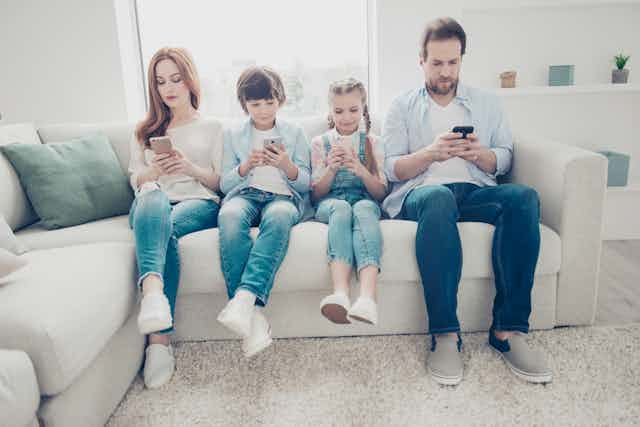
Alone together: how mobile devices have changed family time
Associate Professor in Sociology, University of Warwick
Lecturer Sociology and Policy, Aston University
Disclosure statement
Stella Chatzitheochari has received funding from the Economic and Social Research Council.
Killian Mullan does not work for, consult, own shares in or receive funding from any company or organisation that would benefit from this article, and has disclosed no relevant affiliations beyond their academic appointment.
University of Warwick provides funding as a founding partner of The Conversation UK.
Aston University provides funding as a member of The Conversation UK.
View all partners
There is now widespread concern about the amount of time children spend staring at screens – with many people worried about the negative impacts mobile devices might have on health and well-being.
Concerns have also been raised about the influence of technological change on relationships and face-to-face interactions. Sherry Turkle, a professor of the social studies of science, came up with the famous term “ alone together ” – which is also the name of her book. “Alone together” captures this idea of spending time on devices to the neglect of interacting with those who are physically nearby.
Many people believe that technological changes have had a detrimental impact on the time family members spend together – with “alone together” time colonising family life. Yet, to date, very few studies have actually been done in this area.
Our new research looks to change this, by providing the first real insight into how technology has impacted the way families spend their time in the UK. To do this, we analysed time diaries collected by parents and children aged eight to 16 years-old in 2000 and then again in 2015 – a period that has witnessed rapid technological change.
More time at home and alone
Contrary to expectations, we found that children spent more time around their parents in 2015 than in 2000. This equates to just over half an hour extra a day (347 minutes per day in 2000 and 379 minutes in 2015). Notably, all of this additional time near parents was spent at home.
This was a surprising finding. But looking closer, we found that children reported they were “alone” during all of this additional time at home with their parents. In this sense then, “alone together” time has increased.
Our analysis also showed some relatively small changes in time for shared family activities, with contemporary families spending less time watching TV and more time on leisure activities and family meals. But the overall time spent in shared activities has remained the same.
Our data shows that mobile device use cuts across all aspects of family time. We found that children and parents both spent approximately the same amount of time (around 90 minutes) using mobile devices when together.
We found all these patterns to be particularly pronounced among young people aged 14 to 16. Young people in this group spent around one hour more at home “alone” with their parents in 2015 than in 2000. Mobile device use when near their parents was also more frequent and heavily concentrated.
Lack of quality time?
Academics have long noted the capacity for technology to bring families together at home . And while our research does seem to indicate this could be the case, this increase in time at home may also be associated with other issues such as the parent’s concerns for their children’s safety . Research in the US finds similar patterns of change – with teens spending less time outside the home away from their parents.

There is increasing evidence that the mere presence of a phone negatively affects face-to-face interactions . This may go some way then to explain parents’ perceptions of decreasing family cohesion and time together with their children, reported in earlier studies.
Indeed, we found that both children and parents were using mobile devices during family meals, television viewing, and other activities. So even though this was for a relatively small amount of time, it may have a disproportionate impact on the quality of this time for family members.
Of course, in some cases, it is possible that mobile devices are in fact complementing family interactions. If, for example, family members use them for video streaming, to play group games or to contact other relatives. And further research on mobile device use and content is now necessary to help ascertain their full impact on daily life and move beyond commonly held negative assumptions.
But what is clear, is that although a rise in “alone together” time means families now spend more time at home, it is not necessarily in a way that feels like quality time.
- Social media
- Screen time
- Family life

Head, School of Psychology

Lecturer In Arabic Studies - Teaching Specialist

Senior Research Fellow - Women's Health Services

Lecturer / Senior Lecturer - Marketing

Assistant Editor - 1 year cadetship
- Entertainment
- Environment
- Information Science and Technology
- Social Issues
Home Essay Samples Information Science and Technology Cell Phones
How Cell Phones Affect Our Lives
Table of contents, revolutionizing communication, altering social interactions, impact on productivity, health and well-being considerations, changing work dynamics, references:.
- Chóliz, M. (2010). Mobile phone addiction: A point of issue. Addiction Research & Theory, 18(4), 489-494.
- Clifford, S., & Valdespino, A. (2019). Are you phubbing right now? The Journal of Social Psychology, 159(4), 449-454.
- Kuss, D. J., & Griffiths, M. D. (2017). Social networking sites and addiction: Ten lessons learned. International Journal of Environmental Research and Public Health, 14(3), 311.
- Roberts, J. A., & David, M. E. (2016). My life has become a major distraction from my cell phone: Partner phubbing and relationship satisfaction among romantic partners. Computers in Human Behavior, 54, 134-141.
- Rosen, L. D., Carrier, L. M., & Cheever, N. A. (2013). Facebook and texting made me do it: Media-induced task-switching while studying. Computers in Human Behavior, 29(3), 948-958.
*minimum deadline
Cite this Essay
To export a reference to this article please select a referencing style below

- 3D Printing
- Self Driving Cars
- Network Security
- Information Systems
- Disadvantages of Technology
Related Essays
Need writing help?
You can always rely on us no matter what type of paper you need
*No hidden charges
100% Unique Essays
Absolutely Confidential
Money Back Guarantee
By clicking “Send Essay”, you agree to our Terms of service and Privacy statement. We will occasionally send you account related emails
You can also get a UNIQUE essay on this or any other topic
Thank you! We’ll contact you as soon as possible.
- Trying to Conceive
- Signs & Symptoms
- Pregnancy Tests
- Fertility Testing
- Fertility Treatment
- Weeks & Trimesters
- Staying Healthy
- Preparing for Baby
- Complications & Concerns
- Pregnancy Loss
- Breastfeeding
- School-Aged Kids
- Raising Kids
- Personal Stories
- Everyday Wellness
- Safety & First Aid
- Immunizations
- Food & Nutrition
- Active Play
- Pregnancy Products
- Nursery & Sleep Products
- Nursing & Feeding Products
- Clothing & Accessories
- Toys & Gifts
- Ovulation Calculator
- Pregnancy Due Date Calculator
- How to Talk About Postpartum Depression
- Editorial Process
- Meet Our Review Board
Why Too Much Cell Phone Usage Can Hurt Your Family Relationships
Hero Images / Getty Images
- Why It Makes You Less Connected
The Impact of Phubbing
Strategies to reduce usage.
Cell phones are an invaluable technology that has fundamentally changed the way we communicate and get information. But as with anything good, too much of it can lead to problems. A growing body of research is highlighting the various drawbacks of overusing cell phones and other mobile devices, including—ironically—the fact that all this communication technology is actually pulling us farther apart and negatively affecting our interpersonal relationships.
One increasingly-talked-about downside to constantly being attached to a cell phone is phubbing, or "phone snubbing," a trend that is unfortunately on the rise.
Phubbing is basically defined as looking at a cell phone rather than interacting with the person you are with, and research shows that it can damage your relationship with your romantic partner and may also harm your bond with your kids.
Overusing cell phones and cell phone addiction are the compulsive companions to phubbing, and like phubbing, they are increasingly becoming problems for more and more people. Being constantly attached to our cell phones is taking a toll, not just on our relationships but on our mental and emotional well-being, affecting our overall health.
For instance, cell phone use while driving has become a growing danger: Texting and cell phone use have been shown to dramatically increase the chances of motor vehicle accidents leading to injury and even death.
According to the National Highway Traffic Safety Administration (NHTSA), about 660,000 drivers are using cell phones or other electronic devices while driving at any given moment in the day in the U.S. , and in 2012, driver distraction led to 3,328 people being killed and 421,000 people being wounded in crashes.
Why It Makes You Less Connected
Doing this once in a while is unlikely to be harmful (after all, we all need to occasionally wait for an important email from work or answer a text from a friend about something urgent or timely). But the problem occurs when you check your texts and email every few minutes or several times an hour, and all these "just gonna check my messages" moments add up to a large amount of time spent on the phone.
Before you know it or realize it, you might be using a good chunk of the time you're supposed to be spending with your partner or children focusing on your phone instead of on your family.
And considering how busy families are today, all the time we spend on phones is a heavy price to pay. "The more precious your time is, the more you need to be vigilant about how you spend it," says James A. Roberts, Ph.D., professor of marketing at Baylor University and the author of Too Much of a Good Thing: Are You Addicted to Your Cell Phone? His advice is: We have to set spouse-to-spouse or parent-to-child time that's free of cell phones.
When you are with someone and he is constantly checking, scrolling, texting, or engaged with the cell phone in his hand, it can feel like you are not really fully with that person. "When you have a conversation, it sends a clear message that you are playing second fiddle," says Dr. Roberts. Not only is this behavior rude, but it can damage the quality of that relationship.
Dr. Roberts' study on phubbing, conducted at the Hankamer School of Business at Baylor University, in Waco, Texas, found that nearly half the adults surveyed reported being phubbed by their partner, more than a third said that they felt depression as a result of this behavior, and almost a quarter said that it caused conflict in their relationships.
"Relationships are the cornerstone of our happiness," says Dr. Roberts. "Phubbing makes us feel bad, but even worse, it leads to unhappiness and depression." There's even an evolutionary explanation for why we feel so uncomfortable when we're with someone who's not fully there with us in that moment.
"It's a violation of social conditioning," says David Greenfield, Ph.D., founder of The Center for Internet and Technology Addiction and an assistant clinical professor of psychiatry at the University of Connecticut School of Medicine, in Farmington, Connecticut, "It's an uncomfortable feeling when behavior is not predictable. When someone is in a room with us and is on the phone, we feel like we are in an unsafe situation on a primitive level."
Potential impacts of overusing your cellphone around your family include the following:
It Takes Away From Other Things
We have enough things that interfere with our family time—busy work schedules, homework, extracurricular activities. Research shows that many people often lose track of time when they're on their cell phones (understandable considering how many things we can do on these devices, from checking news and sports scores to seeing what friends are posting on social media sites, not to mention getting email and texts).
When you spend time on the phone, you have that much less time to spend fully engaging and giving your attention to your spouse and kids.
It Is Addictive
Research shows that smartphones are powerful mind- and mood-altering devices that can be as addictive as, say, gambling.
It's Contagious
When people are phubbed, they tend to pull out their own phones in response. "It's cellularitis—a socially transmitted disease," says Dr. Roberts. "When other people use their cell phones, we do it too in self-defense."
It's Just Plain Rude
Phubbing and pulling out your cell phone at the dinner table or in the middle of a conversation is just bad cell phone etiquette. Unless there's an urgent matter you need to hear about, there is no reason to keep your phone at hand when you are with other people.
Kids Learn From Your Behavior
The other thing to consider when you're a parent who is constantly connected to her phone is the fact that kids learn by watching what we do. Even young children, more of whom are getting cell phones at younger ages, are likely to pick up on the way a parent might engage in phubbing and adopt that behavior.
It's Changing the Way We Think
Cell phones have changed the way we interact with each other and have cut down the time we may spend being creative, says Dr. Greenfield. Constant screen use in kids is especially worrisome because all that screen time is changing the way they handle boredom and making it less likely that they'll find time to do activities that encourage them to exercise creativity and use their imagination.
The Time You Spend Comes at a Cost
For every minute of time spent online, there is a cost: The negative impact of having less time for important things in your life such as sleep , leisure time, work, and family time, says Dr. Greenfield.
It's Easy to Lose Track of Time
How many of us have ever been on the phone, checking social media posts or scanning headlines or playing a fun game and then realized later that we'd spent much more time than we had planned? "In every lecture in which I've asked people in the room if they've ever lost track of time when online, eighty to ninety percent of the people admitted doing so," says Dr. Greenfield.
It Erodes Your Relationships
Your interaction with your spouse or child is not as good as you may think. We may picture ourselves as multitasking machines, doing a good job with everything all at the same time. But what we may not realize is that attention has limited capacity, says Dr. Greenfield. When you're with someone and you're on the phone at the same time, you are where the phone is—in the virtual world. "It's not quantity; it's quality," says Dr. Greenfield.
"If you're with your child for five hours but you are on the phone constantly during that time, it's not really spending time with her." And kids agree. An annual survey conducted by the children's magazine Highlights found that 62% of kids aged 6 to 12 said their parents are distracted when trying to talk to them, with cell phone use being the top culprit. Think about how it feels to be ignored—it's certainly not a feeling you'd wish on your children.
Try these strategies for ways to cut back on your cell phone usage.
- Establish a rule in your house that there will be no using phones (or emailing or posting to social media, etc.) after a certain time at night.
- If you feel like you're having a hard time not using the phone constantly, consider seeking help. Research shows that cell phone addiction is real, and if you feel that you don't have control, talk to a therapist who specializes in addiction counseling.
- Keep dinnertime free of cell phones, and use it as an opportunity to reconnect with each other and talk about your day.
- Keep time with your spouse—like date night or catching up on the day before bed—free of cell phones.
- Use an app to monitor how much your kids use their phones, and use it to track your own use.
Przybylski A, Weinstein N. Can you connect with me now? How the presence of mobile communication technology influences face-to-face conversation quality . J Soc Pers Relat . 2012;30(3):237-246. doi:10.1177/0265407512453827
Gershon P, Zhu C, Klauer SG, Dingus T, Simons-Morton B. Teens' distracted driving behavior: Prevalence and predictors . J Safety Res . 2017;63:157–161. doi:10.1016/j.jsr.2017.10.002
Pickrell TM, Ye TJ. Driver electronic device use in 2011 . NHTSA . 2013 Report No. DOT HS 811 719
Zhen R, Liu RD, Hong W, Zhou X. How do interpersonal relationships relieve adolescents' problematic mobile phone use? The roles of loneliness and motivation to use mobile phones . Int J Environ Res Public Health . 2019;16(13):2286. doi:10.3390/ijerph16132286
By Katherine Lee Katherine Lee is a parenting writer and a former editor at Parenting and Working Mother magazines.
Numbers, Facts and Trends Shaping Your World
Read our research on:
Full Topic List
Regions & Countries
- Publications
- Our Methods
- Short Reads
- Tools & Resources
Read Our Research On:
- Networked Families
- The internet, cell phones, and family communication
Table of Contents
- Acknowledgments
- Introduction and previous research
- Household types and technology ownership
- Family social activities and togetherness
- Spouses and children staying connected
- Conclusions: The networked household
- Methodology
The internet plays an important role in keeping in touch with loved ones both near and far.
One-third (33%) of online adults say that the internet has improved their connections with friends “a lot,” and nearly one-quarter (23%) say that it has greatly improved their connections with members of their family. By contrast, far fewer say their internet use has improved their capacity to make new friends: only 12% of internet users feel that the internet has greatly improved their ability to meet new people, and nearly two thirds (64%) say that it has not improved their ability to meet new people at all.
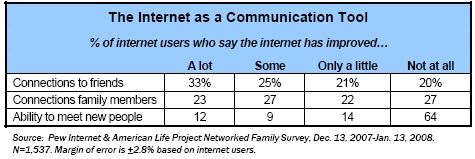
Adults of all ages see the internet as an important tool for maintaining connections with family members, but young people are far more likely than older adults to go online in order to keep in touch with existing friends and make new contacts. 6
As early and avid adopters of social networking, instant messaging and other social media applications, the internet is a key tool for young people to communicate, meet new friends and keep in touch with old ones:
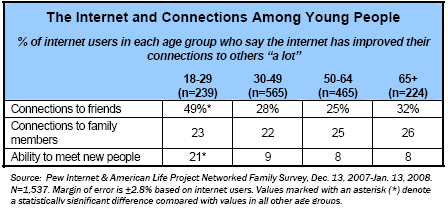
The internet has led to more time working from both the home and office.
Most people view the internet as having a relatively minor influence on the amount of time that they spend on various activities. The primary exceptions are working and watching TV. For many internet users, new communication tools have led to an increase in the time they spend working, whether that work is done at the office or at home. One in five employed internet users (19%) say that using the internet has increased the amount of time they spend working from home, and one in ten (11%) say that it has increased the amount of time they spend working from the office.
Despite the large number of people who now work from home, the blurring of work and family life has surprisingly few quantifiable effects with respect to the ways workers spend their private time. Individuals who work at home at least occasionally and those who are employed but do not work from home are similar in terms of their satisfaction with their time for family, friends and hobbies; the amount of time they spend with other household members; their tendency to socialize with others; and the perceived closeness of their family.
Where employment plays a role (such as in less satisfaction with the amount of time spent on hobbies or relaxation), the key difference is between those who are employed and those who are not—there is little difference between those who work from home and those who do not do so. One notable exception is the difference in time spent having dinner with family members. Among those who are employed and live with a spouse or child, 63% of those who do some work from home every day say they also have dinner with family members daily. By contrast, 48% of those who are employed but do not work from home every day have dinner with family members daily.
Roughly nine in ten internet users say that the time they spend online has had no impact on the amount of time they spend with friends, family, or at social events. These responses are almost unchanged since the last time we asked these questions in early 2001, despite the wide array of new online applications developed since then (and with the caveat that the online population is now much larger than in 2001).
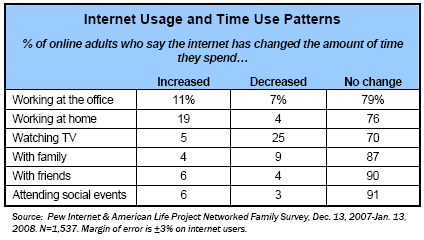
Cell phones and the internet are seen as positive tools for improving the quality of communications with family members, particularly those who live elsewhere.
Most respondents see the internet and cell phones as a positive (or, at worst, negligible) influence on the quality of communications with friends, family and co-workers. 7 The internet and cell phones have the greatest positive impact on the quality of communications with family members living elsewhere, and the smallest positive impact on work-related communications. Notably, about half of the respondents in our survey feel that new communication technologies have not had an impact on their communications with household members, family members elsewhere, friends and coworkers. However, only a small percentage of adults feel that these technologies actually decrease the quality of their communications.
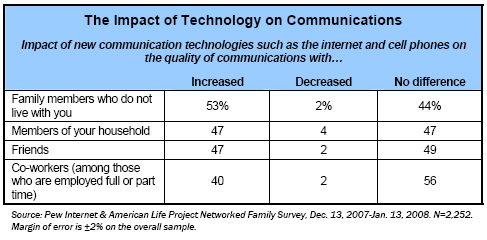
Most adults consider their family today to be as close, or closer, than the family they grew up in as children thanks to the internet and cell phones.
One-quarter of adults (25%) feel that the internet and cell phones have brought their family closer together than their own family was when they were growing up. Six in ten (60%) feel that these technologies haven’t made much difference in this regard, and only one-tenth (11%) feel that their family today is not as close as their childhood family because of new technologies. Families with the most technology – at least one cell phone and an internet connection – are relatively more likely to say their family is closer because of these technologies than are families with low levels of technology use.
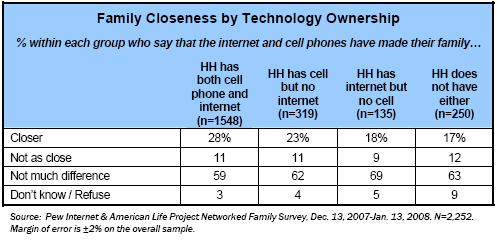
Younger Americans, having spent much of their teens and early adulthood in a world of cell phones and internet access, tend to see little difference in the closeness of their current and childhood families. Two-thirds of 18-29 year olds and 62% of 30-49 year olds say that the internet and cell phones have not made much difference in how close their family is now compared with the one they grew up in. This drops to 55% for individuals age 65 or older.
- This is consistent with other research (see Wang & Wellman 2008; Kennedy & Wellman 2007; Wellman et al 2006; Boneva & Kraut 2002; Horrigan & Rainie 2002). ↩
- This is consistent with a good deal of other research on this subject, such as Wang & Wellman, 2008; Quan-Haase & Wellman 2004; Boase & Wellman 2006; Kennedy & Wellman 2007; Wellman et al 2005; Boneva & Kraut 2002; Horrigan & Rainie 2002; Haythornthwaite 2005; Mok & Wellman 2007; Hampton & Wellman 2003; Boase et al 2003; Copher, Kanfer & Walker 2002. ↩
Sign up for our weekly newsletter
Fresh data delivery Saturday mornings
Sign up for The Briefing
Weekly updates on the world of news & information
- Emerging Technology
- Family & Relationships
- Technology Adoption
A quarter of U.S. teachers say AI tools do more harm than good in K-12 education
Many americans think generative ai programs should credit the sources they rely on, americans’ use of chatgpt is ticking up, but few trust its election information, q&a: how we used large language models to identify guests on popular podcasts, computer chips in human brains: how americans view the technology amid recent advances, most popular.
1615 L St. NW, Suite 800 Washington, DC 20036 USA (+1) 202-419-4300 | Main (+1) 202-857-8562 | Fax (+1) 202-419-4372 | Media Inquiries
Research Topics
- Email Newsletters
ABOUT PEW RESEARCH CENTER Pew Research Center is a nonpartisan fact tank that informs the public about the issues, attitudes and trends shaping the world. It conducts public opinion polling, demographic research, media content analysis and other empirical social science research. Pew Research Center does not take policy positions. It is a subsidiary of The Pew Charitable Trusts .
© 2024 Pew Research Center
Greater Good Science Center • Magazine • In Action • In Education
What Is Your Phone Doing to Your Relationships?
Phubbing is the practice of snubbing others in favor of our mobile phones. We’ve all been there, as either victim or perpetrator. We may no longer even notice when we’ve been phubbed (or are phubbing), it has become such a normal part of life. However, research studies are revealing the profound impact phubbing can have on our relationships and well-being.
There’s an irony in phubbing. When we’re staring at our phones, we’re often connecting with someone on social media or through texting. Sometimes, we’re flipping through our pictures the way we once turned the pages of photo albums, remembering moments with people we love. Unfortunately, however, this can severely disrupt our actual, present-moment, in-person relationships, which also tend to be our most important ones.
The research shows that phubbing isn’t harmless—but the studies to date also point the way to a healthier relationship with our phones and with each other.
What phubbing does to us

In a study poignantly titled, “My life has become a major distraction from my cell phone,” Meredith David and James Roberts suggest that phubbing can lead to a decline in one of the most important relationships we can have as an adult: the one with our life partner.
According to their study of 145 adults, phubbing decreases marital satisfaction, in part because it leads to conflict over phone use. The scientists found that phubbing, by lowering marital satisfaction, affected a partner’s depression and satisfaction with life. A follow-up study by Chinese scientists assessed 243 married adults with similar results: Partner phubbing, because it was associated with lower marital satisfaction, contributed to greater feelings of depression.
Phubbing also shapes our casual friendships. Not surprisingly to anyone who has been phubbed, phone users are generally seen as less polite and attentive. Let’s not forget that we are extremely attuned to people. When someone’s eyes wander, we intuitively know what brain studies also show: The mind is wandering. We feel unheard, disrespected, disregarded.
A set of studies actually showed that just having a phone out and present during a conversation (say, on the table between you) interferes with your sense of connection to the other person, the feelings of closeness experienced, and the quality of the conversation. This phenomenon is especially the case during meaningful conversations—you lose the opportunity for true and authentic connection to another person, the core tenet of any friendship or relationship.
In fact, many of the problems with mobile interaction relate to distraction from the physical presence of other people. According to these studies, conversations with no smartphones present are rated as significantly higher-quality than those with smartphones around, regardless of people’s age, ethnicity, gender, or mood. We feel more empathy when smartphones are put away.
This makes sense. When we are on our phones, we are not looking at other people and not reading their facial expressions (tears in their eyes, frowns, smiles). We don’t hear the nuances in their tone of voice (was it shaky with anxiety?), or notice their body posture (slumped and sad? or excited and enthusiastic?).
No wonder phubbing harms relationships.
The way of the phubbed
What do “phubbed” people tend do?
According to a study published in March of this year, they themselves start to turn to social media. Presumably, they do so to seek inclusion. They may turn to their cell phone to distract themselves from the very painful feelings of being socially neglected. We know from brain-imaging research that being excluded registers as actual physical pain in the brain. Phubbed people in turn become more likely to attach themselves to their phones in unhealthy ways, thereby increasing their own feelings of stress and depression.
A Facebook study shows that how we interact on Facebook affects whether it makes us feel good or bad. When we use social media just to passively view others’ posts, our happiness decreases. Another study showed that social media actually makes us more lonely.
“It is ironic that cell phones, originally designed as a communication tool, may actually hinder rather than foster interpersonal connectedness,” write David and Roberts in their study “ Phubbed and Alone .” Their results suggest the creation of a vicious circle: A phubbed individual turns to social media and their compulsive behavior presumably leads them to phub others—perpetuating and normalizing the practice and problem of “phubbing.”
“It is ironic that cell phones, originally designed as a communication tool, may actually hinder rather than foster interpersonal connectedness”
Why do people get into the phubbing habit in the first place? Not surprisingly, fear of missing out and lack of self-control predict phubbing. However, the most important predictor is addiction—to social media, to the cell phone, and to the Internet. Internet addiction has similar brain correlates to physiological forms like addiction to heroine and other recreational drugs. The impact of this addiction is particularly worrisome for children whose brain and social skills are still under development.
Nicholas Kardaras, former Stony Brook Medicine clinical professor and author of Glow Kids , goes so far as to liken screen time to digital cocaine . Consider this: The urge to check social media is stronger than the urge for sex, according to research by Chicago University’s Wilhelm Hoffman .
These findings come as no surprise—decades of research have shown that our greatest need after food and shelter is for positive social connections with other people. We are profoundly social people for whom connection and a sense of belonging are crucial for health and happiness. (In fact, lack thereof is worse for you than smoking , high blood pressure, and obesity .) So, we err sometimes. We look for connection on social media at the cost of face-to-face opportunities for true intimacy.
How to stop phubbing people
To prevent phubbing, awareness is the only solution. Know that what drives you and others is to connect and to belong. While you may not be able to control the behavior of others, you yourself have opportunities to model something different.
Research by Barbara Fredrickson , beautifully described in her book Love 2.0 , suggests that intimacy happens in micro-moments: talking over breakfast, the exchange with the UPS guy, the smile of a child. The key is to be present and mindful. A revealing study showed that we are happiest when we are present, no matter what we are doing. Can we be present with the person in front of us right now, no matter who it is?

Gift of Time
Spend quality time with people you care about
Studies by Paula Niedenthal reveal that the most essential and intimate form of connection is eye contact. Yet social media is primarily verbal. Research conducted by scientists like the GGSC’s Dacher Keltner and others have shown that posture and the most minute facial expressions (the tightening of our lips, the crow’s feet of smiling eyes, upturned eyebrows in sympathy or apology) communicate more than our words.
Most importantly, they are at the root of empathy—the ability to sense what another person is feeling—which is so critical to authentic human connection. Research shows that altruism and compassion also make us happier and healthier, and can even lengthen our lives. True connection thrives on presence, openness, observation, compassion, and, as Brené Brown has so beautifully shared in her TED talk and her bestselling book Daring Greatly , vulnerability. It takes courage to connect with another person authentically, yet it is also the key to fulfillment.
What to do if you are phubbed
What if you are phubbed? Patience and compassion are key here. Understand that the phubber is probably not doing it with malicious intent, but rather is following an impulse (sometimes irresistible) to connect. Just like you or I, their goal is not to exclude. To the contrary, they are looking for a feeling of inclusion. After all, a telling sociological study shows that loneliness is rising at an alarming rate in our society.
More on Technology
Explore whether technology cuts us off from other people .
Learn how smartphones are killing conversation .
Take Christine Carter's advice to use technology intentionally and stop checking your freaking phone .
How healthy are your online and offline social networks? Take the quiz !
What’s more, age and gender play a role in people’s reactions to phubbing. According to studies, older participants and women advocate for more restricted phone use in most social situations. Men differ from women in that they viewed phone calls as more appropriate in virtually all environments including—and this is quite shocking—intimate settings. Similarly, in classrooms, male students find phubbing far less disturbing than their female counterparts.
Perhaps even worse than disconnecting from others, however, Internet addiction and phubbing disconnect us from ourselves. Plunged into a virtual world, we hunch over a screen, strain our eyes unnecessarily, and tune out completely from our own needs—for sleep, exercise, even food. A disturbing study indicates that for every minute we spend online for leisure, we’re not just compromising our relationships, we are also losing precious self-care time (e.g., sleep, household activities) and productivity.
So, the next time you’re with another human and you feel tempted to pull out your phone—stop. Put it away. Look them in the eyes, and listen to what they have to say. Do it for them, do it for yourself, do it to make the world a better place.
About the Author

Emma Seppala
Emma Seppälä, Ph.D. , is science director of Stanford University’s Center for Compassion and Altruism Research and Education and the author of The Happiness Track (HarperOne, 2016).
You May Also Enjoy

Six Tips for Reading Emotions in Text Messages

How is Technology Shaping Romance?

Five Ways to Build Caring Community on Social Media

How to Keep Technology From Disrupting Your Happiness

Five Tips for Helping Teens Manage Technology

Can Mindfulness Stop Internet Addiction in Teens?
Breathable pants, a bug bite hack and more hot Amazon finds
- TODAY Plaza
- Share this —

- Watch Full Episodes
- Read With Jenna
- Inspirational
- Relationships
- TODAY Table
- Newsletters
- Start TODAY
- Shop TODAY Awards
- Citi Concert Series
- Listen All Day
Follow today
More Brands
- On The Show
How cell phones are affecting families — and what to do about it
There's often a focus on how to get our kids off their phones and back into the great outdoors. But what about parents?
So many are accustomed to keeping their phones at an arms' reach away, and that behavior is having a profound effect on their kids.
Those effects were made all the more unsettling on TODAY when Jenna Bush Hager spoke with Dr. Jenny S. Radesky, a developmental pediatrician at the Boston Medical Center, who studied parent-child interaction at fast food restaurants. Her findings? More than 70 percent of the adults used their phones during the meal.
"When the child is making bids, the parent would respond in kind of a mechanical way or a delayed way," she told Jenna.
According to a recent study, 54 percent of kids think their parents check their devices too often. And 32 percent say they feel "unimportant" when their parents get distracted by their phones.
Doctor Radensky even sees problematic behaviors in her own life.
"When I have a lot of stuff to do for work or I have an e-mail to respond to, all those little cute approaches and, 'Mom, read to me" and everything, is...it creates more tension."
Mike and Josephine Bourgeoise are one of many couples making changes around their home to combat social media and cell phone distractions. With three children, they had a right to be concerned.
"We've established a rule where during dinner, there's no phone allowed," Michael told TODAY. But the rules aren't really to tame the kids.
As Josephine explained, "We don't wanna miss out on anything with our kids because of devices."
Their son Oliver thinks it's a good idea.
"What does it make you feel like when he's on the phone?" Jenna asked him.
"Mad," said Oliver.
And his word choice is significant. Research shows the impact of a parent's constant-connectivity, with young children often describing their reaction as "sad," "mad," "angry," or "lonely."
So, how can a parent find the right balance? The experts offer the following solutions:
- Figure out which triggers are most distracting for you.
- Watch your children's cues constantly, and always acknowledge their basic needs.
- Schedule specific tech-free family time.
- Think twice before using a mobile device while you're with your children.
- Check email before the kids gets up, while they're at school, or after they go to bed.
- Walk in the door unplugged after work.

From Clinique to Crocs, these Shop TODAY editor-loved Amazon finds start at $6


They worked together on ‘Ezra.’ Now Tony Goldwyn wants to help his co-star get on ‘Law & Order’

Caitlin Clark is in her first season in the WNBA. How to watch her next game

Rumer Willis shares how her daughter has helped her find a newfound confidence

2 new giant pandas are coming to the Smithsonian’s National Zoo from China

Pro golfer Lexi Thompson, 29, retires and acknowledges mental health struggles: ‘It’s OK to not be OK’

All of the books you've seen on TODAY — and where to get them

Welcome summer with zucchini schnitzel and glazed salmon

A top-rated nail growth treatment, breathable pants and more of May's hottest Amazon finds — starting at $4
Amazon bestsellers.

Mom of late ‘General Hospital’ actor says he shielded co-worker before he was shot: ‘I use the word hero’
September 4, 2012
How Your Cell Phone Hurts Your Relationships
The mere presence of a phone affects how you relate to others
By Helen Lee Lin
Most of us are no stranger to this scenario: A group of friends sits down to a meal together, laughing, swapping stories, and catching up on the news – but not necessarily with the people in front of them! Nowadays, it’s not unusual to have one’s phone handy on the table, easily within reach for looking up movie times, checking e-mails, showing off photos, or taking a call or two. It’s a rare person who doesn’t give in to a quick glance at the phone every now and then. Today’s multifunctional phones have become an indispensable lifeline to the rest of the world.
We might expect that the widespread availability of mobile phones boosts interpersonal connections, by allowing people to stay in touch constantly. But a recent set of studies by Andrew K. Przybylski and Netta Weinstein of the University of Essex showed that our phones can hurt our close relationships. Amazingly, they found that simply having a phone nearby, without even checking it, can be detrimental to our attempts at interpersonal connection.
Przybylski and Weinstein asked pairs of strangers to discuss a moderately intimate topic (an interesting event that had occurred to them within the last month) for 10 minutes. The strangers left their own belongings in a waiting area and proceeded to a private booth. Within the booth, they found two chairs facing each other and, a few feet away, out of their direct line of vision, there was a desk that held a book and one other item. Unbeknownst to the pair, the key difference in their interactions would be the second item on the desk. Some pairs engaged in their discussion with a nondescript cell phone nearby, whereas other pairs conversed while a pocket notebook lay nearby. After they finished the discussion, each of the strangers completed questionnaires about the relationship quality (connectedness) and feelings of closeness they had experienced. The pairs who chatted in the presence of the cell phone reported lower relationship quality and less closeness.
On supporting science journalism
If you're enjoying this article, consider supporting our award-winning journalism by subscribing . By purchasing a subscription you are helping to ensure the future of impactful stories about the discoveries and ideas shaping our world today.
Przybylski and Weinstein followed up with a new experiment to see, in which contexts, the presence of a cell phone matters the most. This time, each pair of strangers was assigned a casual topic (their thoughts and feelings about plastic trees) or a meaningful topic (the most important events of the past year) to discuss — again, either with a cell phone or a notebook nearby. After their 10-minute discussion, the strangers answered questions about relationship quality, their feelings of trust, and the empathy they had felt from their discussion partners.
The presence of the cell phone had no effect on relationship quality, trust, and empathy, but only if the pair discussed the casual topic. In contrast, there were significant differences if the topic was meaningful. The pairs who conversed with a cell phone in the vicinity reported that their relationship quality was worse. The pairs also reported feeling less trust and thought that their partners showed less empathy if there was a cell phone present.
Thus, interacting in a neutral environment, without a cell phone nearby, seems to help foster closeness, connectedness, interpersonal trust, and perceptions of empathy — the building-blocks of relationships. Past studies have suggested that because of the many social, instrumental, and entertainment options phones afford us, they often divert our attention from our current environment, whether we are speeding down a highway or sitting through a meeting. The new research suggests that cell phones may serve as a reminder of the wider network to which we could connect, inhibiting our ability to connect with the people right next to us. Cell phone usage may even reduce our social consciousness.
Perhaps it would be going too far to prepare for important conversations by throwing your cell phone into the closet, or leaving it in the car on first dates. But if you are spending the day with people you really care about, you might want to reconsider the next time you reach for your phone to reply to a text message or check sports scores. Just having that phone nearby is bad enough.
Are you a scientist who specializes in neuroscience, cognitive science, or psychology? And have you read a recent peer-reviewed paper that you would like to write about? Please send suggestions to Mind Matters editor Gareth Cook, a Pulitzer prize-winning journalist at the Boston Globe. He can be reached at garethideas AT gmail.com or Twitter @garethideas .
Relationship with Cell Phones Essay
The modern world is awash with technological advancements that have made life easy by improving efficiency. One of the most useful pieces of technology today is the cell phone. Cell phones are people’s new relationship because they constitute a core part of their lives (Noel, 2012). They are used to communicate, access the internet, listen to music, play games, and watch videos (Noel, 2012). Research has revealed that many people cannot live without cell phones, which they use to create, develop, and maintain relationships. Cell phones have eradicated the traditional concept of face-to-face interaction in a relationship.
People’s dependence on cell phones is evident from the ease of addiction and their use in almost all daily activities. Scientists have likened phone addiction to a behavioral addiction that is hard to overcome (Noel, 2012). According to researcher James Roberts, “At first glance, one might have the tendency to dismiss such aberrant cell phone use as merely youthful nonsense…a passing fad, but an emerging body of literature has given increasing credence to cell phone addiction and similar behavioral addictions” (Chan, 2012).
Cell phones have become central to people’s lives hence dependence on certain communication and information technology features.
With features such as instant messaging, internet, cameras, games, mp3, and video compatibility, cell phones have become inevitable in life (Chan, 2012). For example, access to social networking services such as Facebook and Twitter has made development and maintenance of a relationship easy. Cell phones have eradicated the need for physical interaction (Chan, 2012). Nomophobia (a term developed to connote fear of losing access to cell phones) is common among many people who are afraid of losing contact with friends and acquaintances via mobile phone (Noel, 2012). A study on nomophobia revealed that many people claimed that losing their mobile phones would make them panic because they would lose contact with friends. In addition, the study revealed that 84 percent of cell phone users could not spend a day without their phones. People have become dependent on cell phones and cannot live without them.
People use cell phones to check emails, take photographs, create reminders, check locations using features such as Google maps, and play games (Chan, 2012). Cell phones are people’s new relationship because people use them to execute many of their daily activities. In addition, people use them as status symbols. According to Dr. James Roberts of Baylor’s School of Business, “Mobile phones are a part of our consumer culture. They are not just a consumer tool but are used as a status symbol. They are also eroding our personal relationships” (Chan, 2012).
Cell phones have both a positive and negative influence on relationships. In many cases, they have been shown to influence relationships negatively. They have encouraged multitasking and solitude because people spend a lot of time interacting with information and communication technology features on their cell phones.
A research study conducted to study people’s dependence on cell phones found out that young people between the ages of 18 and 29 send an average of 3, 200 messages a month. In addition, they check their cell phones approximately 60 times a day, spend seven hours daily using their cell phones for other purposes, and receive an average of 113 texts daily (Chan, 2012). Overdependence on mobile phones emanates from technological advancements that incorporate different features that make them attractive. In addition, they are portable, cheap, and convenient compared to other pieces of technology. Their portability makes them available to people at all times. People cannot live without cell phones because of the great role they play in their lives.
Chan, A. (2012). Cell phone Addiction Driven by Impulsivity, Materialism . Web.
Noel, H. (2012). Cell Phone Dependence just as Real as Substance Addiction . Web.
- Criminal Justice: Prosecution & Judicial Proceedings
- “Moving from Musician as Performer to Musician as Pastor” by William Bradley Roberts
- Comparing Patient Treatment: Approach Key Payments
- Apple's Interactive and Intelligent Design
- Smartphones for Children: Design and Usage
- Technologies: Customized Smartphones for Children
- Skype: All you Need to Know
- Countries to Explore for Product
- Chicago (A-D)
- Chicago (N-B)
IvyPanda. (2020, May 22). Relationship with Cell Phones. https://ivypanda.com/essays/relationship-with-cell-phones/
"Relationship with Cell Phones." IvyPanda , 22 May 2020, ivypanda.com/essays/relationship-with-cell-phones/.
IvyPanda . (2020) 'Relationship with Cell Phones'. 22 May.
IvyPanda . 2020. "Relationship with Cell Phones." May 22, 2020. https://ivypanda.com/essays/relationship-with-cell-phones/.
1. IvyPanda . "Relationship with Cell Phones." May 22, 2020. https://ivypanda.com/essays/relationship-with-cell-phones/.
Bibliography
IvyPanda . "Relationship with Cell Phones." May 22, 2020. https://ivypanda.com/essays/relationship-with-cell-phones/.

Students wait in front of the Academy of Art in San Francisco.
- VALLEY OF THE BOOM
Smartphones revolutionize our lives—but at what cost?
The computer in our hands can do astonishing things, but new studies show just how dramatically they’re distracting us.
Not long ago, as happens almost every day, I got a Skype call on my smartphone from my dad, who lives in Kolkata, India. My dad is 79 and doesn’t get out very much, having become increasingly housebound. On this day, I was traveling by train from Denmark to Sweden. Speaking to him, I held my phone up against the window, its camera lens facing out. We both took in the view of the Swedish countryside as the train pulled out from Malmo and sped toward Lund. For a brief while, it felt like we were traveling together.
For that moment of connection, and many others like it, my phone deserves my gratitude. But the same device has become a source of relentless distraction in my life, intruding upon my attention with frightening regularity and diminishing my in-person interactions with family and friends. On a visit to Kolkata to see my dad, I found myself reaching for my phone every few minutes in the middle of our conversation to scan my Facebook feed and see if a photo I’d recently posted had garnered any fresh likes. (It had! And comments, too!)
Over the past decade, smartphones have revolutionized our lives in ways that go well beyond how we communicate. Besides calling, texting, and emailing, more than two billion people around the world now use these devices to navigate, to book cab rides, to compare product reviews and prices, to follow the news, to watch movies, to listen to music, to play video games, to memorialize vacations, and, not least of all, to participate in social media.
It’s incontrovertible that smartphone technology has yielded many benefits for society, such as allowing millions of people who lack access to banks to conduct financial transactions, for instance, or enabling rescue workers in a disaster zone to pinpoint precisely where their help is needed most urgently. There are apps available for smartphone users to monitor how much they’re walking during the day and how well they’re sleeping at night. New applications of the technology emerge seemingly daily: Your smartphone can now help you stay on top of your children’s dental hygiene by tracking how long they’re brushing their teeth with their Bluetooth-enabled toothbrushes. (My wife and I decided that this was a bit much.)
These benefits, however, seem to have come at a high cost to our mental and social lives. The constant connectivity and access to information that smartphones offer have made the devices something of a drug for hundreds of millions of users. Scientists are just beginning to research this phenomenon, but their studies suggest that we are becomingly increasingly distracted, spending less time in the real world and being drawn more deeply into the virtual world.
The power they hold over us is glaringly evident in our everyday habits and behaviors. Remembering directions is a thing of the past—we habitually rely on our phones to get anywhere, even to destinations we’ve visited numerous times before. The most compulsive users among us keep our phones within clutching distance at all times, reaching for them even when we wake up in the middle of the night. At airports, on college campuses, at the mall, at the stoplight—at almost any public place you can think of—the most common sight of our time is that of people with bowed heads, looking intently at their phones. If you see someone in a café sipping coffee and staring out the window, it’s less likely that they’re enjoying a quiet moment and more likely that their device has simply run out of charge.
For Hungry Minds
Our use of smartphones has effectively changed the geography of our minds, creating a distractive off-ramp for every thought we might have on our own. “What I’ve seen in the last six to eight years is a massive paradigm shift—much of the attentional resource that we devoted to our personal ecosystem has been shifted to what’s virtual,” says Larry Rosen, an emeritus professor of psychology at California State University in Dominguez Hills and co-author of The Distracted Mind: Ancient Brains in a Hi-Tech World. “That means you are not attending to what’s in front of you. We see this in parenting—you are not focusing on your kids. You’re not even focusing on what you’re watching on television because you’re second-screening. It’s affecting every aspect of our lives, and sadly, I don’t think the pendulum has swung as far as it will go.”
Researchers have begun documenting the impact of smartphones on our ability to focus. In one study, Adrian Ward, a psychologist at the University of Texas at Austin, and his colleagues gave 800 participants two challenging mental tasks—solving a math problem while memorizing a random sequence of letters and selecting an image out of a few options to complete a visual pattern. Some participants were asked to leave their smartphones in another room while others were allowed to keep their smartphones in their pockets. Still other participants kept their smartphones on a desk in front of them. Although the phones played no role in the tasks, how accessible the phones were had an effect on how well the participants were able to perform them. Those who had left their phones in another room fared the best. Those with the phones placed in front of them did the worst. But even those who had tucked their phones in their pockets were found to have diminished cognitive capacity.
Researchers worry that addiction to smartphones could dull the ability of young users to read and comprehend texts, which in turn could have adverse impacts on their critical thinking. These concerns are based on the results of studies such as one conducted by psychologist Anne Mangen and her colleagues at the University of Stavanger in Norway. They divided 72 students in the 10th grade into two groups, asking one group to read two texts on paper and the other to read the same texts as PDFs on a screen. The print readers did much better on a reading comprehension test than the digital readers.
You May Also Like

Gambling is everywhere now. When does that become a problem?

How is your location data really tracked? You’d be surprised.

Are ultra-processed foods as addictive as cigarettes?
Another study, conducted at the University of British Columbia, lends support to what many of us have concluded from first-hand experience: Smartphone use can adversely affect social interactions in the real world. The researchers, led by Ryan Dwyer, a doctoral student in psychology, asked more than 300 participants to have a meal at a restaurant with friends or family, instructing some to keep their phones on the table and others to put their phones away. Those who had their phones in front of them reported feeling more distracted during the conversation and enjoyed the meal less than the others.
“When people had access to their phones, they were also more bored, which is not what we were expecting,” Dwyer says. Having your phone on the table while dining, he adds, is “probably not going to ruin your meal, but it could chip away at your enjoyment.” The toll exacted by this phenomenon on close family relationships is easy to extrapolate.
The reason why it’s become so hard for us to set aside our phones, even at mealtimes, isn’t hard to understand. “It’s well known that if you want to keep a person dialed into something, give them a reward at variable times,” explains Ethan Kross, a psychologist at the University of Michigan in Ann Arbor. “Turns out, that’s exactly what email or social media does—you don’t know when you’ll get another like or receive your next email, and so we keep checking.”
Our compulsivity seems to be getting worse, according to a study by Rosen and his colleagues in which they’ve been keeping track of smartphone use by high school students and young adults. Using apps that count the number of times a phone gets unlocked, the researchers found that participants had gone from unlocking their phones about 56 times a day in 2016 to 73 times a day in 2018. “That’s a huge increase,” Rosen says.
Some of the blame lies with notifications, which can be turned off. Another factor is “the anxieties that are in your head,” Rosen says, and these too can be addressed with efforts like mindfulness and meditation. A third and more insidious factor, according to Rosen, is the way technology companies have “carefully orchestrated their apps and their websites to get your eyeballs there, to keep them there and to keep them coming back.”
Responding to these criticisms, phone makers have developed apps to help users monitor their phone screen time. But it’s unclear if apps like Apple’s Screen Time and Google Android’s Digital Well Being will help users curtail the time they spend on their phones. In a study of high school seniors, Rosen and his team found that the study participants did check screen time monitoring apps occasionally and did learn that they’d been spending more time on their phones than they’d thought. But they determined that about half of them made no changes to their behavior. (The researchers are following up to find out what changes the others made.)
Rosen admits to being hooked himself. As a news junkie, he’s constantly opening up Apple News on his phone. “Most of the time, there’s nothing new, but every once in a while, a new story shows up, giving me a positive reinforcement to do it more often,” he says.
Learning to live with the technology without surrendering to it may be one of the biggest challenges we face in the digital era. “We are playing catch-up,” says Kross, who describes the experiential universe opened up by smartphones as a new ecosystem that we’re still adapting to. “There are helpful or harmful ways of navigating the offline world, and the same is true of the digital world.”
Related Topics
- MOBILE PHONES
- INFORMATION TECHNOLOGY AND TELECOMMUNICATIONS

The unexpected health benefits of Ozempic and Mounjaro

How ultra-processed food harms the body and brain

Here's what happens to your body when you quit smoking

What can your DNA say about your risk of opioid addiction?

Alcohol is killing more women than ever before
- Paid Content
- Environment
- Photography
- Perpetual Planet
History & Culture
- History & Culture
- History Magazine
- Mind, Body, Wonder
- Terms of Use
- Privacy Policy
- Your US State Privacy Rights
- Children's Online Privacy Policy
- Interest-Based Ads
- About Nielsen Measurement
- Do Not Sell or Share My Personal Information
- Nat Geo Home
- Attend a Live Event
- Book a Trip
- Inspire Your Kids
- Shop Nat Geo
- Visit the D.C. Museum
- Learn About Our Impact
- Support Our Mission
- Advertise With Us
- Customer Service
- Renew Subscription
- Manage Your Subscription
- Work at Nat Geo
- Sign Up for Our Newsletters
- Contribute to Protect the Planet
Copyright © 1996-2015 National Geographic Society Copyright © 2015-2024 National Geographic Partners, LLC. All rights reserved
How Smart Phones Are Impacting Your Friendships
As I checked my email this morning while walking down the street, I had a moment in which I lifted my head to realize that I couldn’t tell you one thing that had happened along that block. What interactions had I missed by being more engrossed in my wireless world than my physical surroundings?
Increased use of cell phones reflects an overall increase in human communication, connecting people who previously may not have kept in touch. But this level of connectivity also raises several concerns: How are cell phones affecting our social relations? Does our heightened reliance reflect a greater desire to stay more connected to even more people? Are cell phones strengthening already existing relations or facilitating new ones?
A 2008 advertising campaign for Dentyne Gum used clever quips to assert that technology is replacing cherished personal moments. The campaign is based upon the premise of appreciating “face time” — in-person interactions. One of their prints features a man bending down to kiss a woman goodbye as it reads, “The original instant message.” Such messages suggest that sentiments behind intimate interactions are being expressed through (and possibly replaced by) technology. While the advertisements potentially suggest how technology can be used to reflect such emotions, they also highlight the face-to-face interactions that a person loses through wireless communication.
Dentyne Gum's 2008 "face time" ads
According to Hans Geser in Thumb Culture (2005): “Mobile phones may … support tendencies towards closure rather than towards the opening up to new acquaintances … While the intrusion of strangers can be reduced, circles of established friendships can be deepened because a higher density of communication within such circles can be maintained.”
For my senior thesis in Sociology in 2009, I chose to study this exact question, the influence of cell phone use on inter-personal relationships. My results supported Geser’s hypothesis that cell phone use reflects, and is used to strengthen, already existing close relationships. People’s phone use often reflects the hierarchy in which they view their own relationships. One most frequently turns to their phone to reach out to those deemed high priority, simultaneously projecting that their wireless communication is more appealing or important than their physical surroundings. As a consequence, peripheral relationships and face-to-face interactions with strangers or “lower priority” friends are diminished.
Interestingly, people commonly express underlying anxieties associated with their phones. Those who deemed themselves highly reliant reported anxiety stemming from feeling overly dependent — the thought of losing or conducting daily life without a cell phone creates immense stress and discomfort. People who use their cell phones less also experience anxiety when they feel too reachable. They also experience an anxious desire to locate the person at the other end of the cellphone conversation to quell any uncertainty about where one’s friend and family may be or what he or she is doing. This juxtaposition of attachment and anxiety resembles the feelings inspired by a romantic relationship.
I can’t help but return to Dentyne’s campaign and reflect on how well they captured the sentiments behind “send & receive.” Texts are exciting because they are reminders of the relationships that satisfy us. I recognize and appreciate the role my cell phone has played in allowing me to strengthen these relationships.
But in the end, face time can’t be replaced. It often takes conscious effort, but I try to remind myself to find the balance between using my phone to maintain relationships while not closing doors on those yet to be fostered.
Photo Credit : Wikimedia Commons

30,000+ students realised their study abroad dream with us. Take the first step today
Meet top uk universities from the comfort of your home, here’s your new year gift, one app for all your, study abroad needs, start your journey, track your progress, grow with the community and so much more.

Verification Code
An OTP has been sent to your registered mobile no. Please verify

Thanks for your comment !
Our team will review it before it's shown to our readers.

- School Education /
Essay on Mobile Phone: 100 Words, 300 Words, 500 Words

- Updated on
- Feb 21, 2024
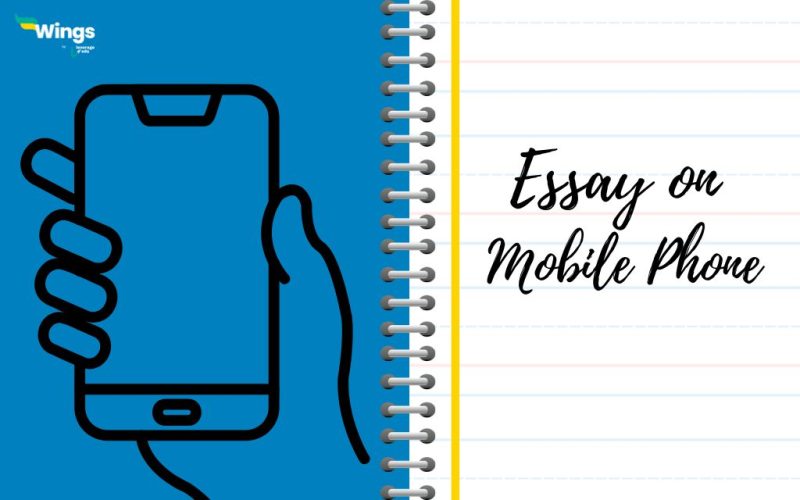
Mobile Phones are portable electronic devices used to make calls, browse the internet, click pictures, and do several other tasks. However, the mobile phones discovered in the early 1970s were quite different from the compact and slim devices we use today. Cell phones were invented by John F. Mitchell and Martin Cooper of Motorola in 1973.
As modern humans, we all use mobile phones for our day-to-day functioning. At academic and higher education levels, students are given the task of writing an essay on mobile phones. An essay on mobile phones requires a comprehensive and detailed study of their history, major developments and the purposes it serve. In this article, we have provided essays on mobile phones for class 6,7,8.9, 10, and 12th standard students. Students can refer to these sample essays on mobile phones to write their own. Keep reading to find out essays on mobile phones and some fun facts about the device.
Table of Contents
- 1 Sample Essay on Mobile Phone (100 Words)
- 2 Sample Essay on Mobile Phone (300 words)
- 3 Sample Essay on Mobile Phone (500 words)
- 4 Essay on Mobile Phone: 5+ Facts About Smartphones
Sample Essay on Mobile Phone (100 Words)
Also Read: The Beginner’s Guide to Writing an Essay
Sample Essay on Mobile Phone (300 words)
Also Read: Essay on Importance of the Internet
Sample Essay on Mobile Phone (500 words)
Essay on mobile phone: 5+ facts about smartphones.
Here we have listed some of the interesting facts about smartphones. These facts can be added to the ‘essay on mobile phones’ to make it more interesting. Below are the 5 interesting facts about smartphones:
- The most expensive smartphone in the world is the Falcon Supernova iPhone 6 Pink Diamond. It is worth $48.5 million.
- The cheapest mobile phone in the world is the Freedom 251. It just cost INR 251.
- Apple is the world’s most popular smartphone
- The first phone greeting was “Ahoy-hoy, who’s calling please?”
- The first smartphone was invented by IBM. It was released by IBM in 1994. The original screen name of the 1st smartphone was “Simon.”
- The first text message in the world was ‘Merry Christmas’
Also Read: Holi Essay: Free Sample Essays 100 To 500 Words In English
A mobile phone system gets its name from diving the service into small cells. Each of these cells has a base station with a useful range in the order of a kilometre/mile.
Mobile phones have become extremely important due to the ease of communication it has brought about. Moreover, it can perform several major tasks easily and effectively. For example, a calculator. Aside from this mobile phones can help a user connect to the internet, and use social media applications, and other applications. Mobile phones can even assist in online payment.
The full form or the meaning of a Moble is Modified, Operation, Byte, Integration, Limited, Energy”. John F. Mitchell and Martin Cooper of Motorola discovered the device in 1973. An essay on mobile phones can include the mobile phone full form.
Related Articles
Mobile phones have become an indispensable part of our lifestyle. There are several advantages and disadvantages of having a smartphone. However, the pros outweigh the cons. A mobile phone essay can be written by including both the advantages and disadvantages. To discover more articles like this one, consult the study abroad expert at Leverage Edu.
Blessy George
Blessy George is a Content Marketing Associate at Leverage Edu, boasting over a year of experience in the industry. Her expertise lies in crafting compelling content tailored to online courses, making her a go-to source for those navigating the vast landscape of digital learning. In addition to online classes, she writes content related to study abroad, English test preparation and visas. She has completed her MA degree in Political Science and has gained valuable experience as an intern.She is known for her extensive writing on various aspects of international education, garnering recognition for her insights and contributions. Apart from her professional pursuits, Blessy is passionate about creative writing, particularly poetry and songwriting.
Leave a Reply Cancel reply
Save my name, email, and website in this browser for the next time I comment.
Contact no. *

Connect With Us

30,000+ students realised their study abroad dream with us. Take the first step today.

Resend OTP in

Need help with?
Study abroad.
UK, Canada, US & More
IELTS, GRE, GMAT & More
Scholarship, Loans & Forex
Country Preference
New Zealand
Which English test are you planning to take?
Which academic test are you planning to take.
Not Sure yet
When are you planning to take the exam?
Already booked my exam slot
Within 2 Months
Want to learn about the test
Which Degree do you wish to pursue?
When do you want to start studying abroad.
January 2024
September 2024
What is your budget to study abroad?

How would you describe this article ?
Please rate this article
We would like to hear more.
Have something on your mind?

Make your study abroad dream a reality in January 2022 with
India's Biggest Virtual University Fair

Essex Direct Admission Day
Why attend .

Don't Miss Out

Essay on Mobile Addiction in English for Children and Students

Table of Contents
Mobile addiction essay: Everyone these days is hooked to his/her mobile phone. While we may dismiss this as a common behaviour in the current times, the truth is that it has deep behavioural and social impacts. Mobile addiction is a real problem and a cause of great concern. It impacts our health, relationships as well as work. People suffering from mobile addiction suffer from nomophobia which is the fear of being without or unable to use your mobile phone for some reason or the other.
Fill Out the Form for Expert Academic Guidance!
Please indicate your interest Live Classes Books Test Series Self Learning
Verify OTP Code (required)
I agree to the terms and conditions and privacy policy .
Fill complete details
Target Exam ---
Long and Short Essay on Mobile Addiction in English
Here are long and short essay on mobile addiction to help you with the topic in your exam or other competitions.
These mobile addiction essay have been written in simple language to convey the facts on mobile addiction.
After going through the essay you would be able to know what is mobile phone addiction, signs and symptoms of mobile phone addiction; impacts/effects of mobile phone addiction and treatment of mobile phone addiction etc.
Also Read: Essay on Computer Addiction
Short Essay on Mobile Addiction 200 words
Mobile phones offer the freedom to instantly connect with just about anyone around the world. They enable us to find any information we require and are a great source of entertainment. While this invention was aimed at empowering us, sadly it is turning out to be something that is overpowering us. Most mobile users these days are suffering from mobile addiction.
One can do so much on a mobile phone. Our mobile phones enable us to indulge in gaming, gambling and online shopping. They connect us with people around the world, allow us to watch movies, click pictures, listen to music, surf the internet and enjoy various other activities. It is hard not to get addicted to this power house of entertainment.
However, it is essential not to fall prey to it. This is because its repercussions could be damaging. Mobile addiction causes several serious problems such as headache, weakened eyesight, sleep disorders, depression, social isolation, stress, aggressive behaviour, financial problems, ruined relationships and no or low professional growth.
Mobile phones have been created for our convenience. We must limit their usage to take charge of our lives. If you feel, you are getting addicted to your mobile phone then look for ways to get rid of it. You should also take it as your responsibility to help your loved ones get rid of this addiction.
Also Check: Essay on Addiction

Essay on Mobile Addiction 300 words – Signs and Symptoms
Mobile addiction is a growing concern. It is easy to get addicted to mobile phones but hard to overcome it. Numerous people around the world are addicted to their mobile phones. The behaviour pattern of mobile addicts is more or less the same. There are certain signs and symptoms that clearly show that a person is addicted to his/ her mobile phone.
Signs and Symptoms of Mobile Addiction
Here are some of the signs and symptoms of people suffering from mobile addiction:
- Display Withdrawal Symptoms: Mobile phone addicts get anxious and angry if their mobile phone battery gets low or dies. They also display anxiety and appear extremely restless, on misplacing their mobile phone. They are almost on the verge of getting a panic attack in such a situation.
- Hallucinate: Some mobile phone addicts even hear their mobile phone ring or vibrate even when it’s actually not the situation.
- Prefer Connecting With People Online: Mobile addicts prefer connecting with people online rather than talking to those, they are surrounded with. They will be on their phone continually even during social gatherings, family dinners or outing with friends.
- Check Mobile Phone Frequently: Mobile addicts check their mobile phones almost every minute even if there is nothing important to do. They simply scroll through the apps to check notifications or view who is online and indulge in other such useless activities on their mobile. They are so addicted to their mobile phones that they do not hesitate checking them even while driving, taking shower and in the middle of an important meeting.
- Lose Sense of Time: Another sign of mobile addiction is a lost sense of time. A person who is addicted to mobile phone loses complete sense of time. He is often late to work and delays important tasks giving priority to his mobile phone.
Also Check: Essay on TV Addiction
People addicted to mobile phones show all or some of the above mentioned symptoms. It is important to take these signs seriously and help your loved ones suffering from mobile addiction.
Essay on Solutions for Mobile Addiction 400 words
How to Get Away/Overcome from Mobile Addiction
It would not be wrong to say that humans have become a slave of the technology. We have particularly grown addicted to our mobile phones. Most people in the current times suffer from severe mobile addiction. It is as if their world revolves around their mobile phones and they cannot do without it even for an hour. It is important to overcome this addiction in order to lead a healthy, wealthy and peaceful life.
Here is how you can overcome mobile addiction:
As is the case with other types of addictions, you cannot overcome mobile addiction unless you do not want to seriously give up on it. Once, you determine, you wish to get over mobile addiction, you can do so by following the below mentioned tips:
- Set Time for Mobile Use
Restrict your mobile usage by setting the number of hours you aim to spend on mobile each day. Assign a fixed amount of time for each activity such as social media, texting, gaming or watching videos. There are apps that help you calculate the time you spend on different apps. Use these apps to work this out.
- Indulge in Other Activities
Involve yourself in activities such as painting, dancing, playing indoor/outdoor games, completing household tasks and the likes to stay occupied. This will lower your urge to check your cell phone frequently.
Help From Loved Ones
Your loved ones always have your back and will be happy to help you get rid of mobile addiction. Spend time talking to your parents, playing with your kid or helping your spouse with work rather than trying to connect with an unknown person online. You will soon notice how much more fun these activities are. Likewise, you may call your friends over to your place and indulge in various fun activities to get your mind off the mobile as you try to get rid of this addiction.
Professional Help
If you aren’t able to cope up with mobile addiction on your own and do not think your loved ones can help you much either then it is time to seek professional help. There are therapists who specialise in mobile addiction therapy. They offer individual as well as group therapy to help get rid of this addiction.
Mobile addiction can ruin our life if it is not stopped on time. Getting rid of this habit may be difficult but it is not impossible. With some effort and support from the loved ones, you can overcome this problem over the time. If this does not help, you should not hesitate to seek professional help.
Also Check: Essay on Technology Addiction
Essay on Impact of Mobile Addiction 500 words
Our mobile phone is meant to ease things for us. It helps us connect with our near and dear ones almost instantly. Communicating with our relatives and friends living in distant lands has become extremely easy with the introduction of mobile phones. A mobile phone with a high speed internet connection serves numerous purposes.
It helps us order food, shop online, look for just about any information online, read e-books, enjoy gaming and what not. But alas, while a mobile phone should be a value addition to our lives, it is turning out to be something that is degrading it. Mobile phones are becoming more and more addictive with the introduction of newer applications each day. Mobile addiction is taking a toll on our lives.
Impact of Mobile Addiction
More than half of the mobile users around the world are addicted to their mobile phones. Mobile addiction is impacting us on different levels.
- Impulsive and Aggressive Behaviour
People addicted to mobile phones are known to show impulsive and aggressive behaviour. They keep checking their mobile phone every few minutes and cannot do without it. New messages and notifications give them a high. Lack of these can make them angry and depressed.
Anger and aggression is particularly seen among those who spend most time playing violent games on their mobile.
- Decreased Attention Span
People addicted to cell phones aren’t able to concentrate on work for long. Too much screen time impacts the brain adversely and decreases the ability to focus. Besides, mobile addicts have a continuous urge to check their cell phones. Thus, they cannot focus on the work in hand.
- Poor Eyesight and Headache
Mobile addicts often complain of headache. They develop migraine issues over the time. Viewing the screen for a long time also hurts the eyes and affects the eyesight.
- Sleep Disorders and Depression
Mobile addicts use their mobile phones until late at night and often develop sleep disorders. The impact of sleep disorders is known to all. It can hamper our work and impact our health badly. Mobile addicts often cut ties from the real world. They are mostly busy connecting with people online, gaming and watching videos. Lack of human contact is the first step to moving towards depression.
- Brain Cancer
Studies reveal that people who talk on their mobile phone for several of hours a day have a high chance of developing brain cancer. This is because mobile phones emit radio waves that damage the brain cells. However, many scientists and medical practitioners do not agree with this finding.
Continual use of mobile phones also impacts our nervous system adversely.
Phubbing is the term used to refer to the habit of constantly checking your mobile even when you are surrounded by people. Mobile addicts develop this habit and it is not good for their personal relationships. As they try to connect with people online, they distance themselves from their loved ones who crave their love and attention. Mobile addicts thus suffer from severe relationship issues.
As much as we neglect it, mobile addiction has become a big problem today. It is hampering our professional life and ruining our personal relationships. Mobile phones are causing more harm than good. People experiencing the problem of mobile addiction must make an effort to get rid of it and return to the real world.
Also Check: Essay on Addiction of Gadgets

Long Essay on Mobile Addiction 600 words – A Common Problem
Mobile addiction is growing by the day. With the introduction of newer and more attractive apps, people are spending more and more time on their mobile phones rather than concentrating on their real life. People have become delusional. They have created a new world for themselves with their mobile phones being central to their lives. It is sad to see how mobile addiction is robbing people of their real lives.
You may have heard about hydrophobia, acrophobia and claustrophobia but have you heard of nomophobia? This is a new kind of fear that is seen in huge number of humans. Nomophobia is “no mobile phone, phobia”. It is the fear of being without one’s mobile phone. It may seem funny to some, but it is an actual fear that grips more than half of the mobile users across the globe. The human race has grown so addicted to their mobile phones that they have developed this new type of fear. The problem is serious and needs attention.
People suffering from nomophobia show the following signs:
- They get easily angered or irritated when they cannot access their phone.
- They panic when they do not find their mobile phone.
- They take their mobile phone everywhere they go including the washroom, dining table and other places where it should not be used.
- They stress when the battery is low.
- They check their mobile phones almost every minute.
- They avoid places that do not have Wi-Fi connections.
Mobile Addiction among Teens
A mobile phone serves as an escape from the problems of real life. People of every age group suffer from mobile addiction. However, teenagers are most likely to develop this addiction.
Teenagers are in that phase of their life where they are discovering and exploring new things. They have numerous questions and their mobile phones have the answers. A mobile phone with an internet connection can answer almost any question they have.
They also have a lot to share but are often hesitant to talk about the same with their parents or teachers. This is because most parents these days are so engrossed in their work that they do not have time to talk to or listen to their kids. Secondly, many things they may want to discuss may be rather embarrassing. Their mobile phones can connect them with numerous people around the world. They make online friends and comfortably share their feelings with them.
Teenagers also like to brag about any new development in their life as it makes them feel superior to others. It is a way to gain popularity in school/ college and win over more friends. Their mobile phones enable them to do so by way of social media platforms.
Teens addicted to mobile phones are the worst. They cannot concentrate on their studies. Mobile addiction bars their ability to focus and lowers their ability to grasp things. Those addicted to mobile phones also have a higher risk of developing habits such as smoking, drinking and taking drugs. They also grow socially awkward as they are constantly on their mobile phone. So, their future is at stake.
Parents must ensure that they do not give smart phones to their teenage kids. It is time for them to concentrate on their studies and explore their interest in other useful activities. They should explore the world the right way and not by means of a mobile phone.
Mobile addiction is more serious than what we think. We must help our loved ones going through this problem. We can help them by talking to them about this problem without being judgemental. Express empathy and be open to their negative reactions. It is difficult to cope up with this problem, but the support from family and friends, can be really helpful in overcoming mobile addiction.
FAQs on Mobile Addiction
What are the symptoms of mobile addiction.
Symptoms include excessive screen time, feeling anxious without the phone, neglecting responsibilities, and constantly checking the phone even without notifications.
How does phone addiction affect your brain?
Phone addiction can reduce attention span, increase stress levels, disrupt sleep, and even alter brain areas linked to decision-making and emotional processing.
How can I reduce my phone usage?
To reduce phone usage, set screen time limits, use grayscale mode, keep phones out of the bedroom, designate tech-free times, and prioritize face-to-face interactions.
What are the bad effects of mobile phones?
Excessive mobile use can lead to eye strain, disrupted sleep, increased stress, decreased face-to-face social interaction, and physical ailments like text neck.
What is the healthy screen time?
Healthy screen time varies by age. For adults, it's advisable to limit recreational screen time to 2 hours daily, while ensuring regular breaks.
Is mobile addiction a serious problem?
Yes, mobile addiction is a growing concern as it can negatively impact mental and physical health, relationships, and overall well-being.
What is the main cause of mobile addiction?
The main cause is the instant gratification phones provide through social media, games, and constant connectivity, which can trigger dopamine release, reinforcing the habit.
What is mobile phone addiction?
Mobile phone addiction is an over-reliance on smartphones, leading to excessive screen time and the inability to reduce usage despite its negative consequences.
Related content
Talk to our academic expert!
Language --- English Hindi Marathi Tamil Telugu Malayalam
Get access to free Mock Test and Master Class
Register to Get Free Mock Test and Study Material
Offer Ends in 5:00

IMAGES
VIDEO
COMMENTS
On the health of family members, the use of cell phones for long periods makes microwave radiation penetrate the brain and cause brain complications. When this occurs, the sleeping patterns are affected. It also causes irritation and impatience on perennial users (Reinberg, 2005).
These relationships were based on trust and cooperation, which is built when people disclose personal information about themselves and are responsive to others. Smartphones, and the constant access they provide to text messaging and social media, make it easier than ever for people to disclose personal information and respond to others in their ...
We found that children and parents both spent approximately the same amount of time (around 90 minutes) using mobile devices when together. We found all these patterns to be particularly ...
This essay examines how cell phones affect our lives, from communication and relationships to productivity and mental well-being. ... social media, and voice and video calls at our fingertips, we can effortlessly stay in touch with friends, family, and colleagues. ... J. A., & David, M. E. (2016). My life has become a major distraction from my ...
Louisa Wright. 05/05/2021. Our phones keep us connected and help maintain relationships, but in some ways they drive a wedge between us, too. Phubbing, or snubbing someone in front of you in favor ...
Why Too Much Cell Phone Usage Can Hurt Your Family Relationships. Cell phones are an invaluable technology that has fundamentally changed the way we communicate and get information. But as with anything good, too much of it can lead to problems. A growing body of research is highlighting the various drawbacks of overusing cell phones and other ...
Cell phones and the internet are seen as positive tools for improving the quality of communications with family members, particularly those who live elsewhere. Most respondents see the internet and cell phones as a positive (or, at worst, negligible) influence on the quality of communications with friends, family and co-workers. 7 The internet ...
First results show that parents use smartphones to keep in touch with their children throughout the day. By doing so, both parents and children gain a feeling of safety and closeness which ...
A set of studies actually showed that just having a phone out and present during a conversation (say, on the table between you) interferes with your sense of connection to the other person, the feelings of closeness experienced, and the quality of the conversation. This phenomenon is especially the case during meaningful conversations—you ...
More than 70 percent of the adults used their phones during the meal. "When the child is making bids, the parent would respond in kind of a mechanical way or a delayed way," she told Jenna ...
We might expect that the widespread availability of mobile phones boosts interpersonal connections, by allowing people to stay in touch constantly. But a recent set of studies by Andrew K ...
Despite the phones' helpfulness, they can lead various negative effects in terms of young people's peer relationships. These often include social exclusion and cyber bullying, as well as changed family dynamics. It is crucial to acknowledge the threats of cellphone use related to socializing and maintaining relationships at a young age.
901 Words. 4 Pages. Open Document. Impact of Technology on Family Life. I think that technology has had both positively and negatively impacted the family life in our society. But I think the positive effects out way the negative ones. In this term paper I will focus on how cell phones, internet, and home security systems.
In conclusion, the usage of cell phones has pros as well as cons on relationships. Cell phones help distant friendships to stay connected but harm the real friends who are right in the very immediate surroundings. Cell phones, a major branch, and growth in technology hurts and well as helps friendships.
The study found that mobile phone is negatively affecting the family life due to its massive usage during family socialization time. The quantitative analysis found that over 85% of respondents ...
With features such as instant messaging, internet, cameras, games, mp3, and video compatibility, cell phones have become inevitable in life (Chan, 2012). For example, access to social networking services such as Facebook and Twitter has made development and maintenance of a relationship easy. Cell phones have eradicated the need for physical ...
Over the past decade, smartphones have revolutionized our lives in ways that go well beyond how we communicate. Besides calling, texting, and emailing, more than two billion people around the ...
For example, a family might be in a house together in the living room, but do not seem to interact with one another because they are too focused on being on their phones. They all tend to pay more attention to the social media and their phones that it has the ability to break apart a family in. Free Essay: Everyone needs to know that cell ...
The Effect of Smartphones on Relationships. Smartphones are powerful devices that have many advantages, but they distract us from relationships. Smartphones get in the way of our relationships, making it impossible for us to wholeheartedly devote our attention to the present moment. Smartphones have become a distraction because we want to be ...
People who use their cell phones less also experience anxiety when they feel too reachable. They also experience an anxious desire to locate the person at the other end of the cellphone ...
The cell phone is a high exposure to germs and bacteria and is an excellent vehicle for this type of parasites that cause gastrointestinal diseases by the constant touch of the screen and then ingesting food with dirty hands. The increase in stress is related to being aware of notifications, emails, and reviews of social networks that produce ...
Sample Essay on Mobile Phone (500 words) Mobile Phone is a portable telephone that performs a variety of functions for its users. The smartphone can be used to text, call, watch movies, listen to music, and even use social media applications. This cellular device has its own advantages and disadvantages.
Essay on Mobile Addiction 300 words - Signs and Symptoms. Mobile addiction is a growing concern. It is easy to get addicted to mobile phones but hard to overcome it. Numerous people around the world are addicted to their mobile phones. The behaviour pattern of mobile addicts is more or less the same.